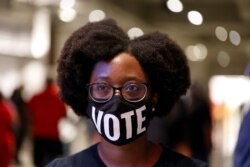Student Union
COVID-19, Race, Climate Change Dominate Youth Vote Issues
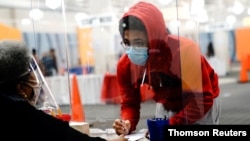
Health care and racism dominate the issues important to young people in the presidential election, according to poll trackers.
Climate change is also among the top three issues to young voters, the Center for Information and Research on Civic Learning and Engagement (CIRCLE) at Tufts University in Medford, Massachusetts, found in its polling.
The Institute of Politics at Harvard’s Kennedy School of Government echoed those findings. About 45% of Americans age 30 and younger agreed they were concerned about having access to health care and mental health care. In addition, 43% of young Americans agreed that they were concerned about someone they know dying from COVID-19.
Gun violence and student loan debt are other issues that will impact young people's lives in the next five to 10 years, said Joseph Mullen, an 18-year-old DNC delegate from Florida’s 23rd congressional district.
“We want elected officials and politicians who are a little bit older than us who, you know, may not be dealing with the ramifications of what they decide in the next 10 to 15 years,” Mullen told VOA. “We want them to act as if it was their lives on the line and it’s their children’s lives on the line as well.”
Health care and racism reflect the concerns of younger voters at a time when colleges and universities have been shuttered by the COVID-19 pandemic, and when racism and law enforcement have been in the national discussion. These have overshadowed student debt concerns that dominated youth voter polls in previous election cycles.
“We have issues like climate change, student loans, free college tuition, free two-year community college, and affordable health care being addressed, and I think those are all really important things to young voters,” said Jordan Harzynski, a freshman at George Mason University in Virginia.
“I think that leadership and rhetoric matters, so up and down the ballot I want candidates that I can trust, and I think that character is playing a bigger role in the minds of a lot of voters this year given the moment were in,” said Josh Kutner, a senior at George Washington University and chairman of GW College Republicans.
“The foremost issue to all voters right now is obviously the coronavirus, as it plays such a major role in our everyday lives now and one aspect of it is making sure we have testing capability and we are able to fully distribute an effective vaccine,” Kutner said.
Young voters are also very concerned about “police treatment to communities of color,” according to a June survey by CIRCLE.
Sanjana Taskar, a recent graduate of the University of Maryland-Baltimore County and an advocate of the Black Lives Matter (BLM) movement, said BLM “is demanding justice to be treated equal and recognizing how our foundation of government was founded on the principles of white patriarchy.”
Concern for climate change is increasing among Democrats, and young Republican voters show a higher interest in politicians attending to climate change than older Republicans, according to Pew Research Center in Washington.
“Millennial and Gen Z Republicans – those currently ages 18 to 39 – are more likely than their GOP elders to think humans have a large role in climate change, that the federal government is doing too little on climate and that the U.S. should focus on developing alternative energy sources,” according to a survey, Pew Research Center stated.
Spencer Lindquist, a junior at Pepperdine University and president of Pepperdine College Republicans, said for him, immigration and student debt were entwined.
“Immigration is an issue that affects young people in particular in a very unique way,” Lindquist said. Graduates accrue student debt “and then they find that they have to compete with people around the world for these positions,” citing Indian and Chinese H-1 work visa holders.
Youth demographics
Young Americans are more engaged in this election than in the previous election, according to CIRCLE.
According to the Tufts CIRCLE survey, “83% say they believe young people have the power to change the country, 60% feel like they’re part of a movement that will vote to express its views, and 79% of young people say the COVID-19 pandemic has helped them realize that politics impact their everyday lives.”
Out of 2,232 voters surveyed, ages 18 to 29, half said that they have tried to persuade people to vote and a quarter said they helped others register to vote, according to CIRCLE. This is significant as it is an increase from the 33% of youth who tried to persuade others to vote and 11% who registered others to vote in the 2018 election.
In 2016, the last presidential election, a little more than 40% of 18 to 29-year-olds voted, according to the United States Elections Project.
While more young Americans are engaged in this year's election, how much they believe the election will actually affect them can depend on race. A recent Harvard poll found that 64% of young white Americans were more likely to agree the election will impact their lives compared with 52% of young black Americans.
Engagement among young voters could be because of issues they believe to be impacting both America and themselves, going into the election. Young voters like the idea of voting for something and feeling mobilized versus voting against something, according to Mullen.
Mullen says that while he is a fan of candidates’ campaign efforts to reach young voters, it’s a mistake for politicians to reiterate the idea of “returning to normalcy.”
“Things have never really felt normal in this country. I was born right after 9/11, and the only things I’ve ever seen in the U.S. have been, you know, wars, recessions and pandemics,” Mullen said. “That’s just what I’ve grown up with.”
See all News Updates of the Day
- By VOA News
Michigan State international students get their own space

Michigan State University in East Lansing, Michigan, is setting aside a space in the International Center for international students.
Nidal Dajani, vice president of the school's International Student Association, said that the club plans to use the space to host events and hopes to collaborate with other student groups.
- By Dylan Ebs
International students find community during Pride Month
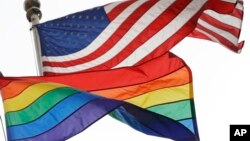
For LGBTQ+ international students, Pride Month, observed in June, is a unique time to reflect.
They hold on to multiple identities — both their LGBTQ+ identity and their cultural background — but coming to terms with them is not always easy.
For graduate student David Zhou, these identities can feel conflicting as transgender rights in China remain a controversial issue and spaces for LGBTQ people close. Zhou, 25, is transgender and pursuing an education in the STEM field at an urban university in the Midwestern United States.
VOA is using a pseudonym for Zhou’s first name and is not naming his university to protect his identity due to safety concerns back home in China. Zhou is not open about his transgender identity to his family.
During Pride Month, Zhou said he attended multiple LGBTQ+ events in his community and is surrounded by a supportive group of LGBTQ+ students who can relate to his experiences. But he’s not open about his identity to everyone on campus and said he doesn’t disclose his preferred pronouns to everyone to avoid transphobic comments.
“I feel like I have to make some judgments of the character of that person to see if they’re a good person to disclose [my identity] to,” Zhou said.
Zhou’s Pride Month celebrations included attending local markets with LGBTQ+ vendors and hanging out with his LGBTQ+ friends.
“They normalized being trans and for a long time I feel like trans identity is, should I say a vulnerability, brings me fear and worrying about discrimination, but having those events are helpful because it allowed me to see that queer people could just [live] openly,” he said.
At social events where few international students are present, Zhou said it can be tough to fit in.
“There's a lot of times like when they were talking about things I kind of, don't really understand, mostly because I kind of lack some background experience or knowledge,” he said.
Zhou said he is not aware of specific groups for LGBTQ+ international students at his university, but said international students are more prevalent in graduate programs and therefore find representation in organizations for LGBTQ+ graduate students.
In China, transgender individuals must obtain consent from an “immediate family member,” even for adults hoping to transition, which critics say limits the autonomy of transgender individuals while supporters say the policy protects doctors from violence by upset parents.
Struby Struble, a former coordinator of the University of Missouri LGBTQ+ Resource Center, told NAFSA: Association of International Educators in 2015 that LGBTQ+ international students face a “double barrier” on campus.
“With their international student friends, they feel isolated because they’re the LGBT one,” she said. “But then among the LGBT students on campus, they feel isolated because they’re the international one.”
Nick Martin, associate director of the Q Center, Binghamton University’s LGBTQ+ student support office, said when international students tour the center, there’s often a sense of hesitation as they enter a type of space that may not be present in their home country.
“I compare that to a year in after they've come into the space, they've again, maybe come to some of our events, they've got more connected,” he said.
Martin said graduate students have a unique interest in the Q Center as they may use the office for research and advocacy purposes that align with their studies.
“For older students, there may be hesitancy in a different way, but I think it's more in the vein of they want to do some of the advocacy work,” he said.
Martin said he thinks about how both his office and BU’s international student office can support students who come from countries with few — if any — protections for LGBTQ+ individuals.
“It's been a learning process of what those students really need, but I think I've kind of learned that a lot of students are just looking for the safe space that we offer,” Martin said.
- By VOA News
International students discuss US campus culture shock

International students at De Anza College in Cupertino, California, talked about culture shock in an article in La Voz News, the student newspaper.
"It felt like a major culture shock. Everything was so different, from academics to mannerism," said a student from Mexico.
Read the full story here.
These are the most expensive schools in the US
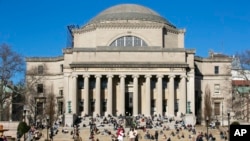
High tuition costs along with housing and food expenses can add up for students at U.S. colleges and universities.
MSNBC looked at the most expensive schools in the country, with one costing more than $500,000 for a bachelor’s degree. (June 2024)
Uzbekistan students admitted into top US universities
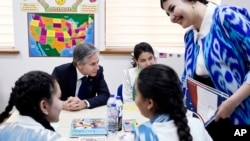
Students from Uzbekistan are among the international students admitted to top colleges and universities in recent years.
Gazata.uz profiled some of the Uzbekistan students attending Harvard, Brown, Princeton and other U.S. universities. (June 2024)




